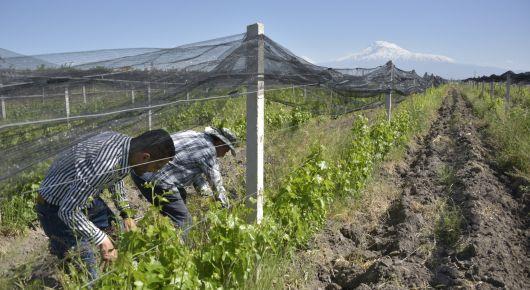FAO calls for sustainable land use at Ankara conference

A half-day discussion on sustainable soil land management, organized by the FAO office in Turkey, took place today at the “Successful Transformation toward Land Degradation Neutrality: Future Perspective” International Soil Congress held 17–19 June in Ankara.
Speakers at the session included high-level representatives from the Ministry of Agriculture and Forestry of Turkey and experts from FAO and the Global Soil Secretariat.
Topics included preventing land degradation, improving land/soil governance, and FAO’s support to integrated land-use planning in Turkey.
In his opening remarks, FAO senior policy officer Sumiter Broca outlined the need for an integrated approach to achieve a sustainable land management.
“The competition among various land uses and the socio-economic drivers of land degradation point to the need for land-use planning that includes a multi-stakeholder participatory process, a capacity development programme for smallholder farmers, the establishment of a link with rural development policies, and the integration of women’s economic empowerment,” Broca added. “Land-use planning should also consider ecosystem management, environmental protection and resilience to climate change.”
Agriculture was the sector most affected by climate change, stated Metin Türker, Deputy Director General of Agricultural Reform, emphasizing the necessity of sustainable soil and land management to protect our national resources.
“If we allow drought and water scarcity to continue, it will eventually lead to desertification,” he added. “Thus, we need to implement methodologies allowing for sustainable management of our resources before it is too late. We have to act and manage existing risk before we end up in a situation of managing a crisis.”
Many countries recognize the need for a more integrated approach in making the connections among spatial planning, land degradation, biodiversity and climate change, but this nexus is not yet reflected in spatial planning regulations or policy.
“To ensure that soil resources in Turkey are sustainably managed and such implementation monitored, FAO and the Ministry of Agriculture and Forestry are jointly developing a draft national action plan,” said Liesl Wiese, FAO sustainable soil management expert. “It should set the priorities for soil management and establish a soil information system to determine the baseline of soil status and monitor implementation. The draft national action plan is planned to be finalized by late August.”
FAO has been active in promoting sustainable land management practices by developing global initiatives and country- and regional-level projects, helping governments develop policy, raising awareness, and assisting farmers and beneficiaries at field level.
One of these significant FAO initiatives is the Global Soil Partnership, which aims to improve the governance of the planet’s limited soil resources to ensure healthy and productive soils for a food-secure world while also supporting other essential ecosystem services.
Turkey has been an active member since the Global Soil Partnership’s founding and has assumed an active role in the establishment of regional partnerships in Europe and Central Asia.
In this context, FAO and the Ministry of Agriculture and Forestry of Turkey have developed two projects: one on strengthening agricultural infrastructure services, and the other, soon-to-be launched, on integrated land-use planning for food security by enhancing climate resilience and ecosystem management.
Additionally, FAO is the implementation agency of a major Global Environment Facility (GEF) project in Central Asia on integrated natural resources management in drought-prone and salt-affected agricultural production landscapes in Central Asia and Turkey (CACILM-2).
FAO and the Government of Turkey will soon launch another GEF-funded project on land degradation neutrality in the Upper Sakarya Basin that aims to set a model for upscaling in Turkey and the region for the monitoring of land degradation neutrality.
After the opening remarks the session continued with the experts’ presentations of FAO and Global Soil Partnership Secretariat, followed by an open discussion and Q&A session.
18 June 2019, Ankara, Turkey
